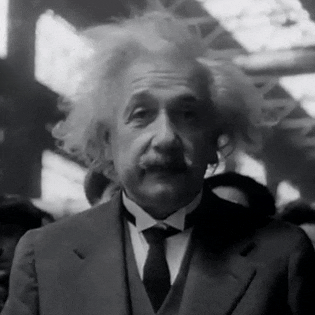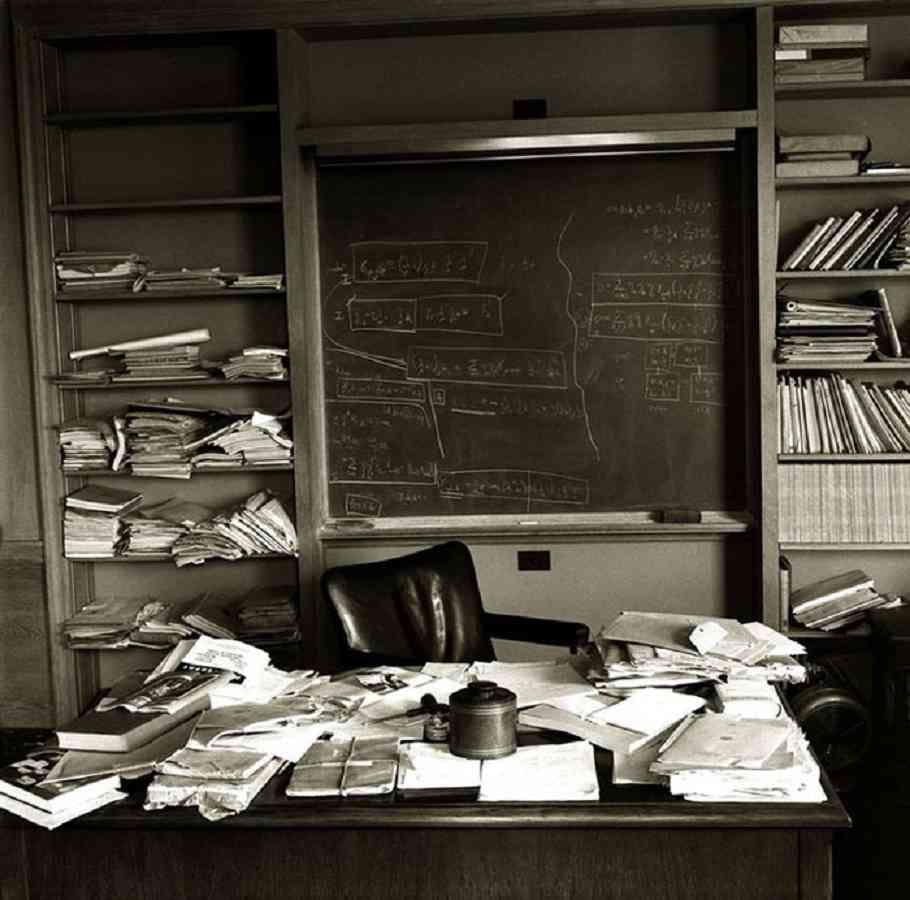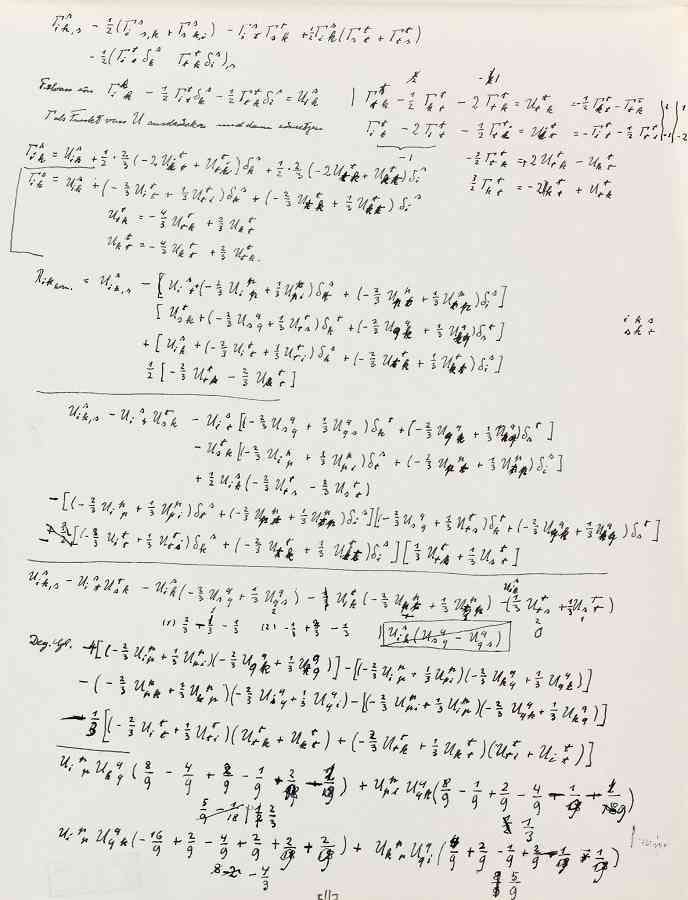Contents
Productivity tips straight from the life of Albert Einstein
By Nidhi ParikhAug 12, 2019

Albert Einstein would say, if a cluttered desk is a sign of a cluttered mind, of what, then, is an empty desk a sign?

This is Einstein’s desk at the Institute of Advanced Studies just hours after his death on April 18, 1955, captured by Ralph Morse a photographer for LIFE Magazine, who sneaked into his office bargaining time for a fifth of Scotch.
Prologue To The Genius
In 1896, Einstein enrolled in Math and Physics teaching diploma at the Swiss Federal Polytechnic in Zurich, Switzerland. But, he wasn’t found in the classes, but in bars and corridors where he would entice women with his violin skills.
Because of his careless and nonchalant attitude he became the black sheep of the class, his professors tagged him a lazy bum and left him destined for a mediocre career in Physics or perhaps in life.
Einstein struggled for two years looking to find a job. He contemplated having jobs of a lab assistant and even selling insurance. He then moved to Berne, Switzerland, to work as a clerk in the Swiss patent office.
The Epiphany
Working six days a week and ten hours a day as a patent clerk, Einstein could not squeeze any time to revel in his wonderland of science, and he could see his love for physics slipping of his fingers.
It slipped right out of the patent office he used to work at...onto the terrace on the other side of the plaza. Einstein then imagined a man jumping from the terrace of the building across the plaza, and as the man fell, he could see the man curving the space with him as he fell.
This was an epiphanic moment -- and he could see a plethora of mathematical wisdom pouring in front of his eyes.
As a result…
The Miracle Year
In March of the year 1905, he developed and submitted a disruptive paper that challenged the then accepted convention that light was a wave, he countered that was instead particle in nature, made up of photons. The debate is continued to this day.
Two months later in the same year, Einstein submitted a second paper. This time his revelations were much more disruptive and later were to be accepted by the world. He denied the then accepted idea that atoms did not exist, by giving solid evidence of their existence.
This was a Miracle year, and he didn’t stop at two papers!
In June 1905, Einstein submitted a third paper—a cannonball bigger than all.
He materialized special theory of relativity according to which the idea that time and space were the same. Though this theory was very controversial in nature and still is, has similarity to the information in the Vedas - the Hindu Scriptures. You can know more about the same here.
To seal the deal,
In September 1905, Einstein published the fourth and final paper of his Miracle year 1905 suggesting that mass and energy were equivalent, and derived the most well-known equation humankind had encountered: E=MC^2.
By the end of his career, Einstein would go on to publish over 300 scientific papers, get honoured with a Nobel Prize in Physics and firmly established himself as one of the greatest scientists of all time.
Einstein’s passion, curiosity and, genius were unparalleled in those times and even to this date--but if you think these were the only things that lead him to unravel the mysteries of the universe on blackboards and notebooks, then you are mistaken.
Einstein did not have a magic wand that with one swoosh in the air materialized his passion, curiosity, and genius for him. Even Though he did not have a magic wand, it was his mad work ethic that did the trick!
His Mad Work Ethic
Einstein died of internal bleeding caused by the rupture of an abdominal aortic aneurysm, a condition a blood-filled bulge in a part of your aorta that runs through your abdomen. One physician familiar with Einstein’s medical history wrote, “For a number of years he had suffered from attacks of upper abdominal pain, which usually lasted for 2-3 days and were often accompanied by vomiting. These attacks usually occurred about every 3 or 4 months.”
The Genius with estimated IQ points of 160, continued to work as mentioned earlier six days a week and ten hours a day despite this pain working on formulae and theories until his very last day.

This document is part of a new exhibition of Einstein memorabilia opening this weekend at the World Expo Museum in Shanghai.
The above-shown page is from Einstein’s last work pad. Even though his theories and formulae didn’t pan out during the year of his life, he didn’t give up trying.
Einstein, his passion and his genius are unparalleled. His passion and genius, when combined with his mad work ethics, gave us all things other-worldly!
Here are some morsels from Einstein’s other-worldly qualities we can use or perhaps now emphasize more on, to be borderline-supernatural productive:
1. Imagination
"Imagination is more important than knowledge. For knowledge is limited, whereas imagination embraces the entire world, stimulating progress, giving birth to evolution." Quotes Einstein famously on the power of imagination.
Imagination can take us where knowledge cannot. This mental capacity has only been bestowed upon us humans out of all sentient beings on earth.
Imagination allows us to think laterally and creatively. This comes in handy while solving complex problems. It is only these complex issues that disrupt our workflow. And where logic is stuck, imagination takes the leap.
Creative people are more imaginative and these people take more risks, challenge the convention, and make life-changing discoveries. It is only the power of imagination that made Einstein, the Wright Brothers, Steve Jobs, Elon Musk, etc.
But imagination can also be a hindrance to productivity, and it's not what you think…
It is of fundamental importance to know that we should ride imagination and imagination should not ride us.
You can achieve supernatural productivity only once you grasp this.
To explain better, when imagination rides us we can become a victim of psychological disorders like PTSD, GAD, SAD and in the worst-case scenario - Schizophrenia.
1. PTSD: Post Traumatic Stress Disorder, wherein a person relives past traumatic experience again and again through their imagination.
2. SAD and GAD: Social Anxiety Disorder and Generalized Anxiety Disorder are one of the most common anxiety disorders that reduce workplace productivity along with other things around the world.
3. Schizophrenia: The imagination goes so wild that the person actually sees, hears and feels what they imagine.
Like Plato said, "Change your mind and change your reality." We all use our imagination to define life and sometimes when we are not aware of our imagination we happen to define life -- negatively, which directly affects our ability to function socially. The most important aspect of our social life, that gets affected, is our work life.
It could be difficult to hold onto jobs, handling coworkers, clients, dealing with project proposals, managing project proposals, and other activities of the like.
To use imagination as a tool, only when needed is the only way that is going to make us hyper-successful. How you do we do that? By being aware of our imagination and also by meditating.
Takeaway,
Imagination helps you see all the angles of a task, and thus allow you to find a quicker and easier way to solve it. Use imagination to be creative and do not let the imagination use you.
2. Curiosity
Einstein quotes, "The most beautiful experience we can have is the mysterious. It is the fundamental emotion that stands at the cradle of true art and true science. Whoever does not know it and can no longer wonder, no longer marvel is as good as dead, and his eyes are dimmed.”
Wonderment and curiosity go hand in hand, a curious mind is an active mind, always looking out creative ways to finish a task, to learn new skill sets to get better pay. Sidney Sheldon, once said, “To be lucky, you need to show up more often.” A person driven by curiosity will always show up more often utilizing their time more often, and squeezing out the most from their situations, naturally making them more potent, more productive.
When we are curious, we come from a place of not knowing, this helps us absorb and understand things faster and in a better way since we do not come with any preconceived notions.
A productive person is not necessarily hardworking, they could be smart-working in most cases. Curiosity is one of our fundamental motivation that helps us to seek the unknown, therefore evolve, and help us get things done in a better way.
Takeaway,
The more curious you will be, the more you will know. The more you know, the more efficiently you will be able to get a task done.
3. Solitude
Einstein needed a fair bit of quietude his entire life. It is well known that he would trade friends and family time, now and then to spend time with himself.
“If you feel bored and lonely when you are alone, then you are in a bad company.” Quoting the famous existentialist French philosopher Jean Paul Satre.
Einstein would wander off to the silent cabins in the Swiss mountains or sail away in wooden boats or play violin in the silence of the hour, these were the times when he would generally figure out the answers to indigenious questions.
Einstein celebrated solitude like a festival,
“No telephones, no responsibilities, absolute tranquility...I am lying on the shore like a crocodile, allowing myself to be roasted by the sun, never see a newspaper, and do not give a hoot about the so-called world.”
The point is to transcend memory. As humans are we just a heap of memory? Memory as in the things that happened to us, and are not so precise recollection of the same. Solitude brings about a kind distimulation that is required to bring us back to our ground state, where we are neither our imagination and certainly not our memory.
British Zen Philosopher and Theologian Alan Watts, profoundly declares that the soul has its logic and that the soul’s logic is superior to the mind’s.
Solitude is important to make a clearer sense of the thoughts in 0ur heads, it helps us to be original, creative and innovative since there is least outside interference when we are just with ourselves.
We are not asking you to lock yourself up in a room and turn down invitations to parties, but now and then find a moment of silence and solitude, where you can take a deep breath -- shut your mind for a while -- and restart it again. This my friends is one of the most powerful and easy ways to be efficient and productive.
Takeaway,
We do not need to say how much better working in silence and solitude is. We can find solitude in brief moments now and then, this will reboot our mind, giving the 2.5 kg muscle, the relaxation it needs, making it a super-productive machine.
It is always smart to ask for help…
Get the right tools and systems around you in your workspace that aids to your productivity. SmartTask is a Project Management Software that makes your team more efficient and productive in the easiest of ways. From onboarding the team on one digital platform for instant communicating, assigning and tracking tasks to tracking the location of on-field workforce and managing customer relationships, this Task Management Software is the right digital tool to make your team hyper-efficient and super-productive.
Get a customized demo of SmartTask - Project Management Software for your specific team and business needs here. Or see the plans directly here.




